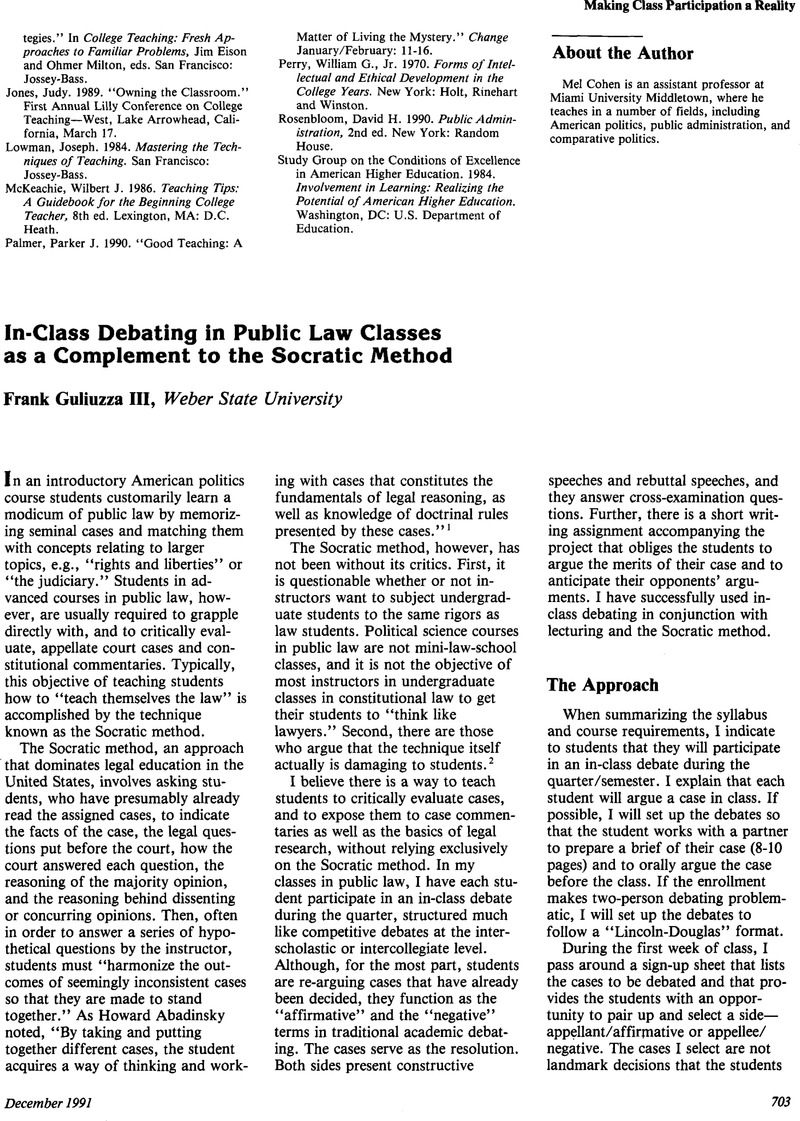Article contents
In-Class Debating in Public Law Classes as a Complement to the Socratic Method
Published online by Cambridge University Press: 02 September 2013
Abstract

- Type
- The Teacher
- Information
- Copyright
- Copyright © The American Political Science Association 1991
References
Notes
1. Abadinsky, Howard, Law and Justice (Chicago: Nelson-Hall Publishers, 1988), p. 55.Google Scholar
2. See Bonsignore, John and others, Before the Law: An Introduction to the Legal Process (Boston: Houghton Mifflin Company, 1989)Google Scholar; Burgess, Susan, “Against the Socratic Method: Fostering Student Self Confidence and Intellectual Independence,” Focus, 6, 11 (Fall, 1990)Google Scholar; Pipkin, Ronald, “Legal Education: The Consumers' Perspective,” American Bar Association Journal, 1976, 1191 (1976)Google Scholar; Savoy, Paul, “Toward a New Politics of Legal Education,” Yale Law Journal, 79, 457 (1970)CrossRefGoogle Scholar; Steinberg, Victoria, “Why I Quit Law School,” College Digest, Spring, 1982 Google Scholar; Turow, Scott, One-L (New York: Farrar, Straus, and Giroux, Inc., 1977)Google Scholar; and Watson, Andrew, “The Quest for Professional Competence: Psychological Aspects of Legal Education,” Cincinnati Law Review, 37, 131 (1968).Google Scholar In defense of the Socratic method, see Lief Carter, “An Invitation to the Dance: A Reply to Professor Burgess”; Nagel, Robert, “Invisible Teachers: A Comment on Perceptions in the Classroom,” Journal of Legal Education, 32, 359 (1982)Google Scholar; Stone, Alan, “Legal Education and the Couch,” Harvard Law Review, 85, 412 (1985)Google Scholar; and Turow's more positive comments about his legal education at Harvard Law School.
3. For a brief explanation of the format in academic debate, see Lee, Ronald and Lee, Karen King, Arguing Persuasively (New York: Longman, Inc., 1989), pp. 230–32.Google Scholar One need not be an expert in competitive debate to use this method in class. There are several good texts that summarize the general responsibilities of each speaker in a debate. In addition to the text cited above, one might look at Church, Russell and Wilbanks, Charles, Values and Policies in Controversy: An Introduction to Argumentation and Debate (Scottsdale, AZ: Gorsuch Scarisbrick, 1986)Google Scholar; Fauls, Don, Rieke, Richard, and Rhodes, Jack, Directing Forensics (Denver: Morton Publishing Company, 1972)Google Scholar; Ziegelmueller, George and Dause, Charles, Argumentation: Inquiry and Advocacy (Englewood Cliffs, NJ: Prentice-Hall, 1975)Google Scholar; and Reeves, Douglas and Reeves, Sandra, The Constructive (Cheyenne, WY, SPDR, 1980).Google Scholar
- 3
- Cited by




